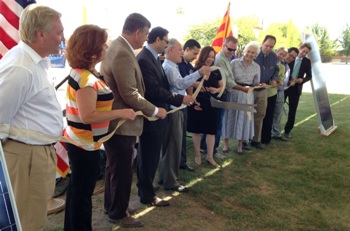May 14 2014
Tucson Unified School District (TUSD) today announced the completion a 198 kW solar power system at Marshall Elementary School in Tucson, Ariz.

Marshall Elementary is the first school of an 11-megawatt solar generation project. According to TUSD the project will supply approximately 80 percent of the electricity needs for 42 schools in the district and save an estimated $170,000 in energy costs in the first year and $11 million over the 20 year-year term of the project.
TUSD leaders and governing board members were joined by Tucson Mayor Jonathan Rothschild and other dignitaries today to launch TUSD's extensive solar energy project in a ribbon cutting event at Marshall Elementary School. Representatives from Congressman Ron Barber's office, City Council offices, Natural Power and Energy, and Constellation were also in attendance.
In addition to Marshall Elementary, the first group of schools that have been "solarized" includes Erickson, Gale, Henry, Soleng Tom and Wheeler Elementary Schools, as well as Secrist Middle School. Bringing solar energy to schools provides students with an up-close view of alternative energy at work. TUSD will incorporate an educational component, with the goal of encouraging students to pursue careers in science, technology, engineering and math – or STEM.
"We're very excited about what this project will bring to the district in terms of savings through fixed utility rates for the next 20 years as well as the overall energy efficiency that will come to our schools," says TUSD Superintendent H.T. Sanchez. "Our solar energy initiative is conducive with the creation of our five-year strategic plan to build a better TUSD for our community. We're focused on meaningful improvements that matter to families and taxpayers, and this project leads the way."
The solar project requires no upfront capital from the district. TUSD competitively selected Natural Power and Energy to oversee design, construction and financing of the project. CORE Construction is providing construction services. Constellation will finance, own and operate the solar power systems. TUSD will purchase and receive all of the electricity generated by the solar panels under a 20-year solar services agreement with Constellation.
"By drastically reducing energy costs over the term of the project TUSD can divert those funds to focus on what it does best, which is providing education," said Rob Dallal, CEO of Natural Power and Energy. "Additionally, the solar project will save a significant amount of money for TUSD from day one, without having access to local utility incentives for solar." On the project's environmental benefits he added: "Whether or not you believe in climate change, just simply from a risk management point of view, we should be taking steps, in the example of TUSD, to diversify into renewables, because we simply don't have another planet with which to experiment."
"During a time when many school districts are looking for ways to do more with less, on-site solar generation helps keep electricity prices affordable, while at the same time allows for the deployment of distributed generation at the school campuses," said Brendon Quinlivan, director, solar sales for Constellation. "Structuring solar projects as solar service agreements provides energy solutions that require no upfront capital from customers and provide long-term fixed power costs that are less than projected market rates."
The solar generation project will be comprised of approximately 36,400 polycrystalline modules mounted on both parking canopies and shade canopies over fields and playground areas. The project is expected to generate 19 million kilowatt-hours of electricity during its first year of production. Generating the same amount of electricity using nonrenewable sources would result in the release of approximately 19,400 tons of carbon dioxide or the equivalent to the emissions of 4,042 passenger vehicles annually, according to U.S. EPA data. TUSD will retain ownership of the environmental attributes, or Renewable Energy Credits (RECs), associated with the project's clean energy production, thereby offsetting its own carbon footprint.